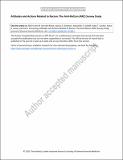Attitudes and Actions Related to Racism: the Anti-RaCism (ARC) Survey Study
Author(s)
Burnett-Bowie, Sherri-Ann M.; Zeidman, Jessica A.; Soltoff, Alexander E.; Carden, Kylee T.; James, Aisha K.; Armstrong, Katrina A.; ... Show more Show less
Download11606_2021_7385_ReferencePDF.pdf (871.2Kb)
Publisher Policy
Publisher Policy
Article is made available in accordance with the publisher's policy and may be subject to US copyright law. Please refer to the publisher's site for terms of use.
Terms of use
Metadata
Show full item recordAbstract
Abstract
Background
Racism negatively impacts health and well-being. Members of the medical community must intervene to address racism.
Objective
To assess whether attitudes about the impact of racism on health or society are associated with intervening around racism.
Design
Cross-sectional survey of a large department of medicine in an urban academic setting.
Participants
Interns, residents, fellows, and faculty.
Main Measures
The primary outcome was the likelihood of intervening around an observed racist encounter or a racist policy. Predictor variables included age, gender identity, race/ethnicity, and attitudes about racism.
Key Results
Although the majority of the 948 respondents endorsed the impact of racism on health and other societal effects, levels of endorsement were lower among older individuals, or those reporting male gender identity or selecting other race. Higher endorsement of the impact of racism on health was associated with increased odds of speaking up about a racist encounter or racist policy, with odds ratios from 1.18 to 1.30 across scenarios. Likelihood of speaking up about racism did not differ by racial or ethnic group, but older individuals were generally more likely to speak up and individuals between 20 and 29 years of age were more likely to speak with someone other than leadership or the source of a racist encounter.
Conclusions
Awareness of the effects of racism on health is associated with increased likelihood of intervening when a racist encounter is observed or a racist policy is noted. Including information on the impact of racism on health and creating safe spaces to discuss racism may increase the likelihood of bystander intervention in anti-racism strategies.
Date issued
2022-02-14Department
Massachusetts Institute of Technology. Department of PhysicsPublisher
Springer International Publishing
Citation
Burnett-Bowie, Sherri-Ann M., Zeidman, Jessica A., Soltoff, Alexander E., Carden, Kylee T., James, Aisha K. et al. 2022. "Attitudes and Actions Related to Racism: the Anti-RaCism (ARC) Survey Study."
Version: Author's final manuscript